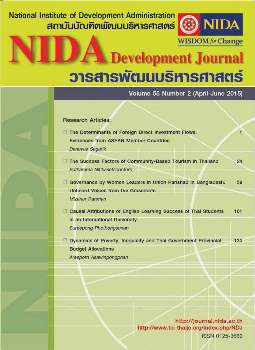Dynamics of Poverty, Inequality and Thai Government Provincial Budget Allocations
DOI:
https://doi.org/10.14456/ndj.2015.5Keywords:
Inequality, poverty, government budget expenditureAbstract
This article examines the impact of government budget allocations (in per capita units) on inequality and poverty by single household level covered in 75 provinces. The study was based on in-depth analysis of the dynamics of government expenditures and other factors such as inflation, gross provincial product (GPP) and unemployment to the two main welfare indicators (inequality and poverty). The study applied panel data analysis on the provincial level. The results showed that government budget allocations per capita from each ministry can alleviate inequality to some extent; likewise, they can also reduce the poverty rate. Also, if other factors are considered, higher inflation in Thailand leads to higher inequality. This study can serve as guidance for the Thai government; research in more depth and detail could serve as a starting point for determining which government expenditures and programmes should be focused on more as investments to relieve inequality and poverty.





